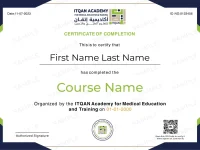
Mastering Medical Decision Making
- Duration:
- Certificate:
Medical decision-making is critically important as it directly affects patient care quality, patient and staff satisfaction, and resource utilization. This course aims to enhance clinical decision-making by developing critical thinking and evidence-based evaluation skills in medical professionals. Through comprehensive training, participants will learn to navigate complex medical decisions influenced by ethical, legal, and cultural factors. The curriculum focuses on the use of decision-making tools and the integration of artificial intelligence to improve patient outcomes and resource management. This empowering educational experience is pivotal for advancing healthcare quality and staff satisfaction.
Learning Objectives
By the end of the program, participants will be able to learn the following:
- Understand the different types of medical decisions and the factors that influence them.
- Develop critical thinking skills to evaluate the quality and relevance of medical information.
- Learn how to use decision-making tools and models to support clinical reasoning and judgment: Scripts, Schemes/Cognitive Aids/Mnemonics, Scoring Tools/Calculators, Clinical Pathways/Checklists/Protocols, Patient-centered Decision Aids, Computerized Clinical Decision Support Systems, Artificial Intelligence etc.
- Explore ethical, legal, and cultural considerations that impact medical decision making.
- Practice effective communication strategies with patients and colleagues to enhance shared decision making.
- Identify common cognitive biases and heuristics that can affect medical decision making and develop strategies to mitigate them.
- Apply evidence-based approaches to clinical decision making, including the use of clinical guidelines, algorithms, and clinical decision support systems.
- Reflect on personal biases and assumptions that may influence medical decision making and develop strategies to address them.
- Understand the role of uncertainty and risk in medical decision making and learn how to communicate these concepts to patients.
- Improve patient outcomes by making informed, evidence-based medical decisions that are aligned with patient preferences and values.
Accreditation | |
|
Who Should Attend This Course
Course format
- Interactive lectures
- Virtual Case scenario
- Quizzes
- MCQ
How Can I Get a Completion Certificate

Attend
The course.

Pass
the required MCQs assessment. (Pass score 75%)

Participate
In Case scenarios, quizzes and discussion
FAQ
Who should attend this course?
Doctors, nurses, paramedics, and healthcare students are encouraged to attend.
Are there any specific prerequisites or requirements for enrollment?
While there may not be strict prerequisites, a basic understanding of medical principles would be beneficial.
What types of medical decisions will be covered in the course?
The course will explore a variety of medical decisions, including diagnostic decisions, treatment decisions, and preventive care decisions.
Will there be opportunities for hands-on practice?
Yes, the course will likely include opportunities for participants to practice applying decision-making tools and techniques in simulated scenarios.
What is the format of the workshop?
The format may include lectures, case studies, discussions, and hands-on activities.
Learner Reviews





Case Studies